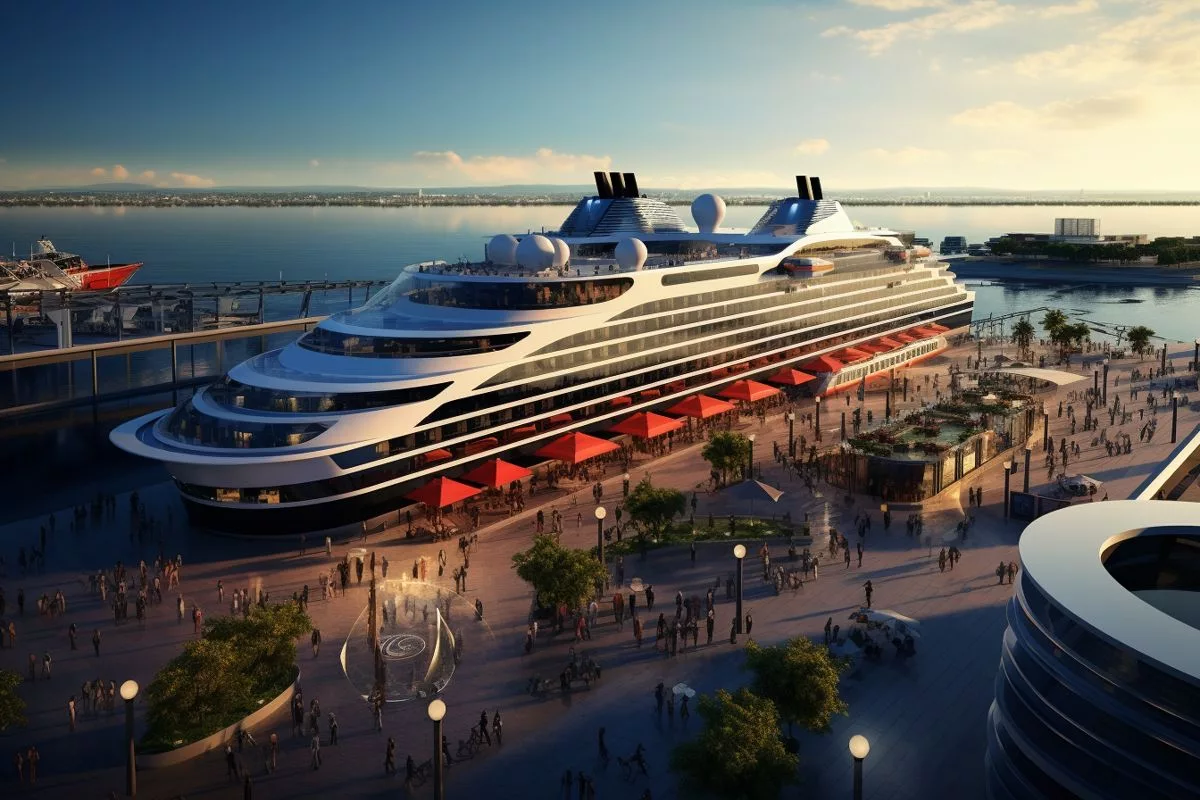The Nelson Mandela MSC Cruise Terminal in Durban represents a symbol of economic growth, rejuvenation, and hope for South Africa. This infrastructure development aims to increase tourism in the region and establish Durban as a key player in the global cruise tourism market. The terminal is part of a comprehensive national plan to improve and modernize South Africa’s ports, contributing to job creation and socio-economic development.
The Nelson Mandela MSC Cruise Terminal is a significant infrastructure development designed to augment tourism in Durban and the entire nation, contributing to the local tourism sector’s expansion. The terminal is anticipated to lure figures similar to those of Cape Town, making Durban a key player in the profitable global cruise tourism market. The broader objective is to introduce new and modern cruise terminals that serve as gateways to the ports of Durban and Cape Town and the entire continent.
A Beacon of Economic Growth and Recovery
In the heart of Ethekwini Metropolitan Municipality stands the Nelson Mandela MSC Cruise Terminal, an emblem of a grand vision encompassing economic growth, rejuvenation, and optimism. This significant project, introduced by President Cyril Ramaphosa, is more than a mere structure. It signifies a significant stride towards re-establishing Durban’s status as a leading cruise tourism destination.
The inauguration of this cruise terminal surpasses the significance of an ordinary milestone. It manifests the city’s resolve to place itself among the top cruise tourism destinations globally. This terminal is an infrastructure development designed to augment tourism in Durban and, by extension, the entire nation.
The choice to name the terminal after “Nelson Mandela”, a name synonymous with liberty, perseverance, and unity and globally celebrated, is both an homage to the nation’s founding father and a strategic choice. Tourists disembarking in Durban will be welcomed by this distinguished name, imbuing them with the positive spirit that South Africa symbolizes and hopes to share with its visitors.
A Significant Contribution to Local Tourism
The establishment of this top-notch facility by the Mediterranean Shipping Company (MSC) and Africa Armada Consortium greatly contributes to the local tourism sector’s expansion. The global cruise tourism market, currently estimated at approximately 174 billion US Dollars, offers immense potential. Durban, along with Cape Town, is strategically positioned as a desirable stop for cruise ships, thus making it a key player in this profitable industry.
The cruise terminal’s impact is already discernible. The past year witnessed local cruise tourism flourishing, with the previous cruise season pumping an estimated R1.2 billion into the Western Cape’s economy alone. The initiation of the Nelson Mandela MSC Cruise Terminal is anticipated to lure similar figures to KwaZulu-Natal.
The Transnet National Ports Authority spearheaded this Public-Private Partnership through a thirty-year concession agreement for the cruise terminal’s design, development, financing, construction, operation, maintenance, and eventual handover to the Ports Authority. This agreement aligns with the projected capital investment by the terminal operator, amounting to R298 million for the terminal.
Vision for South Africa’s Ports
The broader objective is to introduce new and modern cruise terminals that serve as gateways not only to the ports of Durban and Cape Town but to the entire nation and even the entire continent. These port cruise terminals are expected to offer multi-modal connectivity to the region and the world, thus contributing to the tourism industry’s growth.
This project is part of a comprehensive national plan to refurbish, improve, and rejuvenate South Africa’s ports. Over time, various inefficiencies have caused the international ranking of the Port of Durban to decline. However, with recent progress and initiatives like the KZN Logistics Hub Programme, the situation is gradually ameliorating.
The KZN Logistics Hub Programme, initiated by the National Ports Authority, is a strategic move to augment capacity in the ports of Durban and Richards Bay. This initiative encompasses 33 flagship projects, all aimed at enhancing the ports’ functionality. The Port of Durban will witness development concentrated around five precincts: Island View, Container, Bayhead, Maydon Wharf, and the Point and Recreation precinct. The goal is to nearly quadruple container capacity and double automotive capacity. The programme, estimated to require an investment of approximately R157 billion, aims to create over 570,000 employment opportunities over the next 15 years.
Another commendable initiative is the redevelopment of the Durban Bay Waterfront. This project, facilitated by Transnet in partnership with the municipality, the province, and Ithala Bank, aims to convert the marina into a world-class economic, tourism, water sports, and recreation asset.
The contribution of state-owned enterprises to the economic and social well-being of all South Africans is paramount. Such enterprises, in tandem with committed private sector partners like MSC, play a crucial role in fulfilling the aspirations for economic growth, job creation, and socio-economic development.
The Nelson Mandela MSC Cruise Terminal is more than an infrastructure investment. It is a commitment to the future of the South African tourism industry. It is anticipated to attract more tourists, leading to increased local economy spending, job creation, and support for local, especially small, businesses.
Each time a cruise liner docks in this city, South Africa becomes more vividly inscribed in the memories of these tourists, increasing the likelihood of their return. The Nelson Mandela MSC Cruise Terminal thus transcends its physical structure. It transforms into a beacon of hope and a pledge for economic growth and recovery, living up to the greatness of the man whose name it carries.
1. What is the Nelson Mandela MSC Cruise Terminal?
The Nelson Mandela MSC Cruise Terminal is an infrastructure development designed to increase tourism in Durban and establish it as a key player in the global cruise tourism market. It is part of a comprehensive national plan to modernize South Africa’s ports and contribute to job creation and socio-economic development.
2. Why is the terminal named after Nelson Mandela?
The choice to name the terminal after Nelson Mandela is both an homage to the nation’s founding father and a strategic choice. Tourists disembarking in Durban will be welcomed by this distinguished name, imbuing them with the positive spirit that South Africa symbolizes and hopes to share with its visitors.
3. How does the terminal contribute to local tourism?
The establishment of the Nelson Mandela MSC Cruise Terminal contributes greatly to the local tourism sector’s expansion. The terminal is anticipated to lure figures similar to those of Cape Town, making Durban a key player in the profitable global cruise tourism market. The broader objective is to introduce new and modern cruise terminals that serve as gateways not only to the ports of Durban and Cape Town but to the entire continent.
4. What is the vision for South Africa’s ports?
The vision for South Africa’s ports is to introduce new and modern cruise terminals that serve as gateways not only to the ports of Durban and Cape Town but to the entire nation and even the entire continent. These port cruise terminals are expected to offer multi-modal connectivity to the region and the world, thus contributing to the tourism industry’s growth.
5. What is the KZN Logistics Hub Programme?
The KZN Logistics Hub Programme is a strategic move to augment capacity in the ports of Durban and Richards Bay. This initiative encompasses 33 flagship projects, all aimed at enhancing the ports’ functionality. The Port of Durban will witness development concentrated around five precincts: Island View, Container, Bayhead, Maydon Wharf, and the Point and Recreation precinct. The programme, estimated to require an investment of approximately R157 billion, aims to create over 570,000 employment opportunities over the next 15 years.
6. How does the Nelson Mandela MSC Cruise Terminal contribute to economic growth and recovery in South Africa?
The Nelson Mandela MSC Cruise Terminal is more than an infrastructure investment. It is a commitment to the future of the South African tourism industry. It is anticipated to attract more tourists, leading to increased local economy spending, job creation, and support for local, especially small, businesses. Each time a cruise liner docks in this city, South Africa becomes more vividly inscribed in the memories of these tourists, increasing the likelihood of their return. The Nelson Mandela MSC Cruise Terminal thus transforms into a beacon of hope and a pledge for economic growth and recovery, living up to the greatness of the man whose name it carries.








